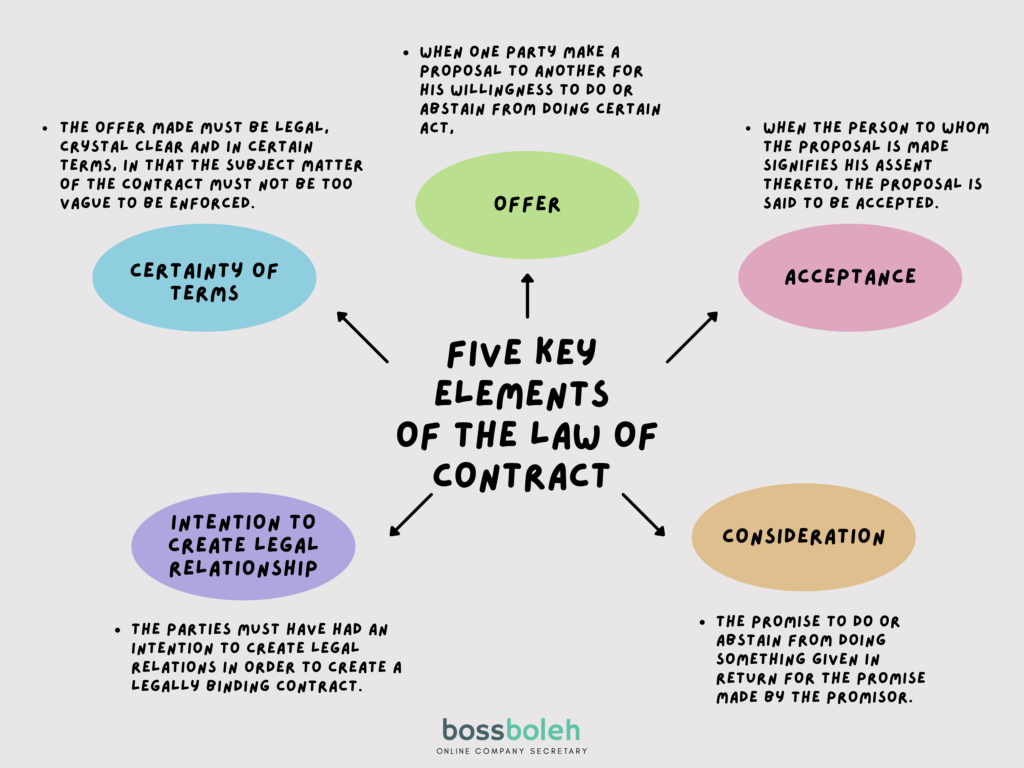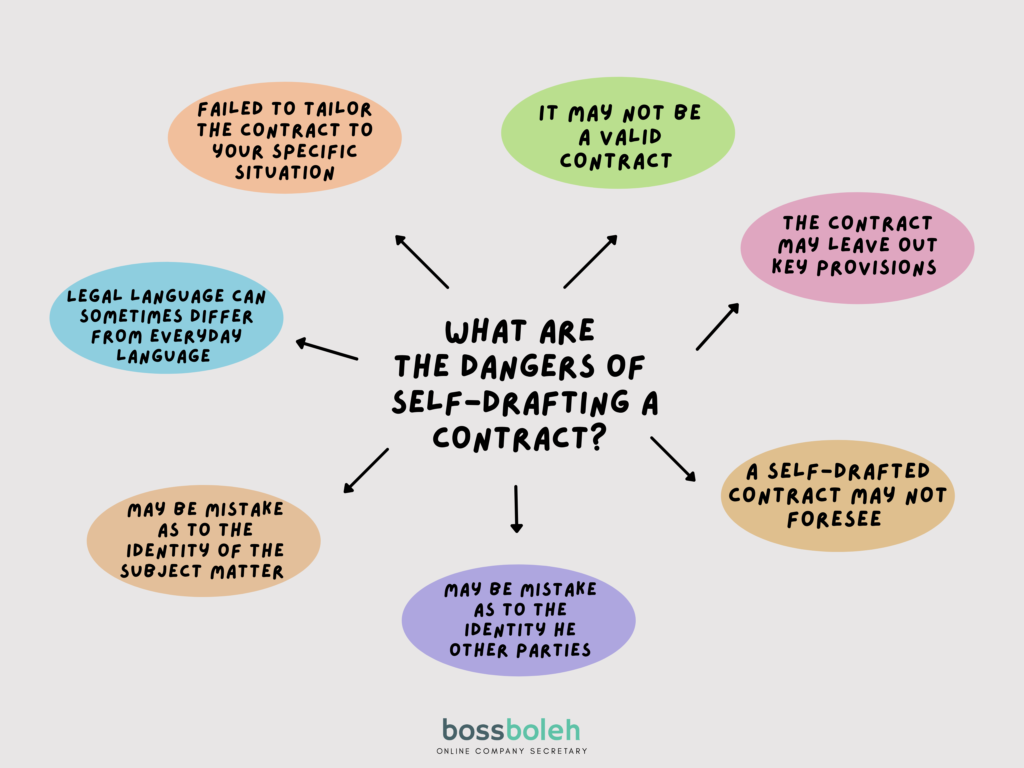What is a Contract?
We enter into contracts every day. Almost everything that we do from buying KFC and McDonald’s to buying clothes in clothing retail stores, to buying a property, is regulated by the law of contracts. A contract, in simple terms, is an agreement between two parties that is enforceable by law. However, how do we know if an agreement is a valid contract? The Law of Contract states that all agreements are contracts if they have the following five key elements:-

- Offer–when one party make a proposal to another for his willingness to do or abstain from doing certain act, and intends to obtain the other person’s assent to the act or abstinence. The person making the proposal is called promisor. For example, Ali offering to sell his Honda City to Abu for RM50,000.00. Ali is said to has signified his willingness to do an act, which is to sell his Honda City to Abu, with a view of obtaining Abu’s assent to the act.
- Acceptance –when the person to whom the proposal is made signifies his assent thereto, the proposal is said to be accepted. A proposal, when accepted, becomes a promise. The person receiving the proposal is called promisee. Acceptance must correspond to the exact terms of the proposal with no variation in order for the acceptance becomes valid and enforceable. So, when Abu signifies his acceptance to Ali’s proposal to purchase the Honda City for RM50,000.00, Abu is said to has accept Ali’s proposal.
- Consideration – the promise to do or abstain from doing something given in return for the promise made by the promisor. This means that a promisee cannot enforce a promise unless something has been promised or given in return. For example, money is usually the consideration given to a grocery shop when you buy some foods or drinks. Services such as professional services, hospitality, medicine are some other examples of the exchange of value between contractual parties. Hence, Abu’s promise to pay the sum of RM50,000.00 is the consideration for Ali’s promise to sell the Honda City, and Ali’s promise to sell the Honda City is the consideration for Abu’s promise to pay the RM50,000.00.
- Intention to create legal relationship– The parties must have had an intention to create legal relations in order to create a legally binding contract. An intention to create legal relations is presumed in commercial transactions. We often enter into a contract without the intention to be legally bound and this is commonly seen in social, family or other domestic relationship, for instance, with friends and family. In order to determine whether there is an intention to create legal relationship is by looking at what the parties involved appear to have agreed on, by looking at the language used, the parties’ conduct in the surrounding circumstances and the object of the contract. If all that Ali and Abu had was a casual conversation, it is difficult to infer that they intended to create a legal relationship, however the intention is more obvious if there was an agreement executed between them.
- Certainty of terms- The offer made must be legal, crystal clear and in certain terms, in that the subject matter of the contract must not be too vague to be enforced. All essential terms must be agreed and the contract cannot otherwise be uncertain, vague or ambiguous.
Does it have to be in writing?
A contract can be in writing or made orally as long as it is not required to be written by law. Section 10(1) of the Contracts Act 1950 states that “All agreements are contracts if they are made by the free consent of parties competent to contract, for a lawful consideration and with a lawful object, and are not hereby expressly declared to be void.”
Section 10(1) of the Contracts Act 1950 provides that all agreements are contracts if they are made by parties competent to contract, for a lawful consideration, and with a lawful object. The section did not go on to state that all contracts must be made in writing before they can be said to be valid and enforceable.
As said by Gunn Chit Tuan J in Diamond Peak Sdn Bhd v. Dr. Tweedie, an oral contract for the sale of immovable property is valid and enforceable under our law.
In Keongco Malaysia Sdn Bhd v Ng Seah Hai, Chew Soo Ho JC said that the law still recognizes an oral contract provided that the party concerned will be able to prove the existence of such a contract and its validity.
However, the law also made it clear that in some situations, a contract must be made in writing. Section 10(2) of the Contract Act 1950 states that some contracts are required to be in writing for the contracts to be enforceable in a court of law. For instance, a promise to pay a debt barred by limitation law should be in writing and signed by the debtor.
Based on the above cases, it is well established that the law allows for a contract to be made orally. Having said that, the issue with oral contracts is that oral contracts are very much difficult to prove and enforce as can be seen in the following case:-
In HARCHARAN SINGH S/O SOHAN SINGH v RANJIT KAUR D/O S GEAN SINGH, the plaintiff was the younger brother of the deceased while the defendant was the wife of the deceased. The property in question was purchased by the plaintiff and the deceased and was registered in both their names. The defendant became the administratrix of the deceased’s estate. The plaintiff alleges that due to the deceased’s family and financial problems, the deceased, by an oral agreement, had sold his half of the share in the land to the plaintiff. The plaintiff applied for a declaration that he is the beneficial owner of the deceased’s half undivided share in the said property and an order that the defendant as administratrix of the deceased’s estate transfers the half undivided share in the said property to the plaintiff. It was held that the plaintiff had failed to prove that there was an agreement between him and the deceased where he alleged that the latter had agreed to sell half of his share to the former. In fact, the plaintiff had not even attempted to transfer the half undivided share of the deceased during the lifetime of the deceased.
Thus, it would be wise to put a contract in writing to avoid future disputes as to the existence of the contract and the actual terms agreed by the parties. Below are several key points to take note of as to why a contract must be set in writing:-

In view of the above, it is strongly recommended for an oral contract to be immediately put in writing to avoid future misunderstandings or disputes between the parties. If a contract is not in writing, it may well be difficult to prove that you have a contract at all. Having a written contract is like having an insurance policy. The hope is you never have to refer to them but you might be relieved if and when you do.
Is it safe to have your contract drafted by yourself?
We have already established the necessity to have your contract to be put in writing in Part 1 of the Article. The next issue arises as to can you draft your own contract? Is it safe to do so?
First of all, any agreement made between two or more parties is a contract if they are made by the free consent of parties competent to contract, for a lawful consideration, and with a lawful object as explained in Section 10(1) of the Contracts Act 1950. This includes any oral contract and even a handwritten contract. So, yes, you can write your own contract and it is totally valid.
Having said that, this doesn’t mean you should write your own contract. You can try, but that doesn’t mean you should. So, what are the dangers of self-drafting a contract?

- It may not be a valid contract– A valid contract must have five key elements, which is offer, acceptance, consideration, intention to create legal relationship and certainty of terms. If there is not a clear statement of what is being agreed to, in that the subject matter of the contract is too vague to be enforced or the consideration is not described plainly or there is no consideration provided, then a contract may not be valid and enforceable. For instance, A intend to offer for sale his property in Mont Kiara to B but failed to provide the particulars of the title of the property for correct identification in the contract. This will render the contract to be void.
- The contract may leave out key provisions– Drafting you own contract may leave out the key provisions and clauses that protect your rights and interest. You may miss out some important clauses or obligating yourself to something unnecessarily thus create an accidental legal obligation. Contracts created with online templates are often overly broad or vague and fail to provide specific details and provisions. For example, a sale of goods contract requires very specific details and provisions that allocate loss and liability with clauses such as price and payment, delivery, passing of title and risk, enforcement and remedies etc.
- A self-drafted contract may not foresee all the issues and complications that might arise- You may not be able to foresee issues and complications that might arise and may not be able to clearly explain what will happen if one party doesn’t follow through on their responsibilities under the contract and how disputes are to be resolved if and when they arise. A contract that is badly worded or ambiguous can be problematic.
- You may be mistake as to the identity of the other parties– You may not be contracting with the parties you think are contracting with. For example, the self-drafted contract may fail to make it clear the legal entity that is entering into the contract (a person or company), or the identity as to the other contracting party who are required to perform their obligations in relation to the contract.
- You may be mistake as to the identity of the subject matter– You think you are agreeing to Y when actually you are agreeing to X. Such mistakes usually arises where one party intends to deal with one thing and the other with a different one. For instance, A intends to offer for sale his property in Mont Kiara to B but B believes that A is offering property in Publika which is also owned by A.
- Legal language can sometimes differ from everyday language– Legal language has a unique vocabulary that makes it different from everyday speech and writing and is difficult to understand. Some recognizable words take on different or new meanings when used in the law for instance, “consideration” in contract law, has nothing to do with thoughtfulness. It means something of value given by a party to an agreement.
- Failed to tailor the contract to your specific situation– The problem with using the free online template is these agreements fail to address legal issues unique to the particular transaction in question. These free templates may still contain clauses that are unrelated or may be from a different country altogether.
In conclusion, can you write your own contract? Yes, you can. However, can you write a “good” contract yourself? The answer seems to be “No”. It’s very important to point out that once you have signed the contract, you are legally bound to those terms no matter how badly the self-drafted contract is worded or how ambiguous the contract is. It is worth mentioning that it costs far more to solve problems that could have been prevented by paying a lawyer to draft a contract correctly in the first place.
Want to know more about starting a Sdn Bhd? What’s the best way to start one, and what should you be mindful of? Register and find out in our upcoming webinar!


Are you ready to form your Sdn Bhd with Malaysia’s #1 award-winning Online Company Secretary? Contact us now via WhatsApp @018-767 8055
